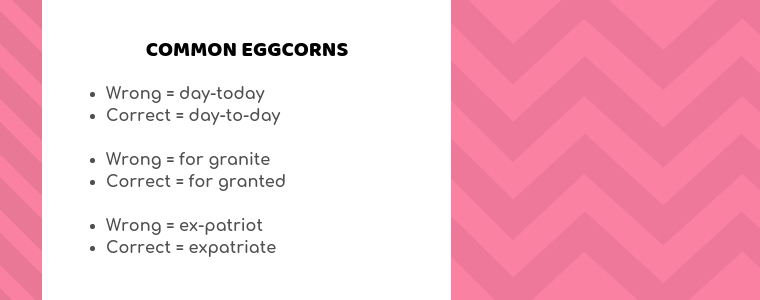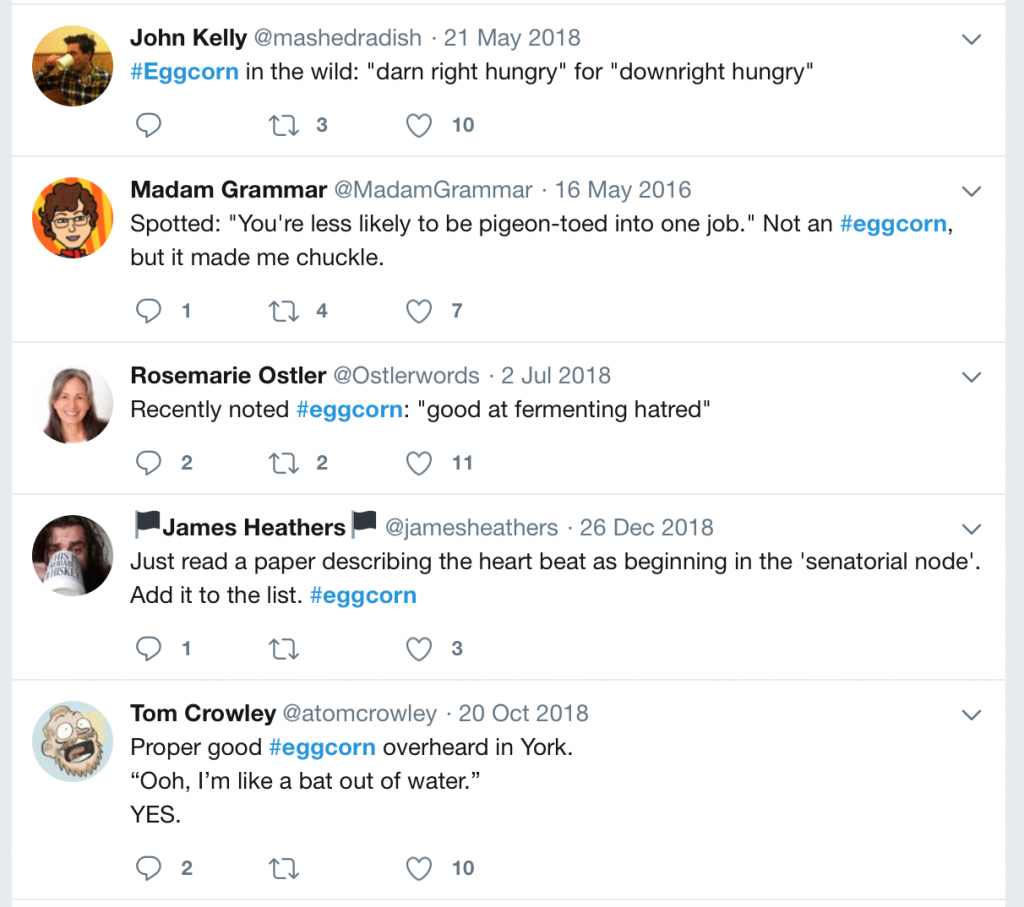On a commute to work, some may ask you about jig-solve puzzles, others may ask you how your day-today life is.
At the same time, some folks just like commenting about an ex-patriot – “Someone who previously loved their country but became so sick of it they relocated” (Courtesy of The Independent.)
Half of what I just said may have made sense to you. After all, I was just inquiring about your day-to-day life as an expatriate who may or may not know about jigsaw puzzles.
Makes sense?
I’m sure it does.
So why did I just mess up the words above? Because I was trying to introduce you to eggcorns – common English mistakes that aren’t actually mistakes because someone just heard them wrong, forgot to Google any doubts, and wrote them down.
Put simply, eggcorn is a term used to describe words that have been heart wrong, therefore, written wrong.
Hence:

So what are Eggcorns, really?
Remember that dress that tore the internet into two halves – the one that looked blue with black fringes to some and white with golden lace fringes to others? We could blame our eyes for picking one side of the argument.
But really it was our brain that was interpreting differently.
Eggcorns are similar.
These are commonly touted as slips of the ear, but it’s the brain which is the culprit. Even then, we blame the ear. I assume that’s because hearing is its department.
Merriam-Webster defines an eggcorn as, “a word or phrase that is mistakenly used for another word or phrase because it sounds similar and seems logical or plausible.”
I’m certain you have heard lots of such eggcorns.
The Twitterverse sure has:

When you hear an eggcorn, you may shrug it off or shoot puzzled looks toward the person who utters such a misheard word.
But you can’t glare at a writer through the online screen, which is why, as a writer, it is your duty to cleanse your copy from eggcorns to save others the effort of shooting daggers at it.
This is one of the reasons why we’re having this egg-talk today. Other reasons:
- I’ve heard eggcorns tons of time, I wasn’t sure that they had a name though
- I think it is fair to share this with anyone who so much as writes an email
- We are all in the pursuit of better writing
How did eggcorns come to be?
In 2003, on a conversation on a blog named Language Log, linguists discussed an interesting matter. With their reading glasses perched on the tip of their noses, they discussed how a woman called ‘acorns’ ‘egg corns.’
Technically, the term made sense. After all, the lady hadn’t called an acorn, “rainstorm” or something out of the blue.
Had it been that, the case would have been filed under malapropism and left to gather dust.
Since the term was different as it surfaced from a misunderstanding, misspelling, or mispronunciation of the word, ‘acorn,’ the British-American linguist, Geoff Pullum, suggested that such terms be called, ‘eggcorns.’
How such a matter escaped the notice of early Grammar Gods is still a mystery. Or, maybe they brushed the matter and blamed it on the ears.
The reality is that language is fluid, and new cases come up regularly. Luckily, eggcorns found a home in the online Merriam Webster database in 2015.
And, while we’re at it, let’s also make it clear that eggcorns are close cousins of mondegreens, not mondegreens themselves.
Mondegreens are the terms that are used to categorize misunderstood or misinterpreted poems, phrases, mottos, and the like. A case in point is ‘cross-eyed bear’ for ‘cross I bear.’
Mondegreens usually show up when we hear the lyrics wrong such as Bon Jovi’s ‘It doesn’t make a difference if we are naked or not.’
In truth, it is, ‘It doesn’t make a difference if we make it or not.’
The fact of the matter is that eggcorns are becoming increasingly common. So, we need to be careful with our writing.
4 more examples of eggcorns
- ‘I can’t wait for lunch any longer. Can you please pass me the cold slaw?’
If I could, I would for sure, buddy. Except, there is no such thing as cold slaw. Unless you were referring to coleslaw.
And, while you’re focused on that salad, I’m thinking about someone better, Cole Kol Mikaelson. Any fans, over here?
- ‘By the end of the day, I was so sad that I ended up lying down in the feeble position.’
When you’re sad, you may end up lying in a fetal position, all curled up. You are not weak or feeble. So, fetal is the position that you may have been looking for here.
- ‘The freelancers in my circle are real goal-getters, they are all working hard.’
Before you get a goal, you will need to go toward it, so you’ve probably misheard this one too. So, replace the goal-getters with go-getters.
- ‘In the mist of things, I forgot to mention that we had to go grocery shopping’
That’s midst of things, as in middle of the things here.
Staying safe of the egg(corn) attack
Here are some of the steps that you can take:
- Use words that you’re familiar with
Sure, fancy vocabulary can be seductive to use.
You want to throw in a new word or two.
But the simpler language you use, the better as it makes your writing easy-to-understand. This holds true in all types of writing, whether it is writing blogs, email writing, or web copywriting.
In fact, Boomerang proved that writing emails like a 3rd grader gets a better response. Why? Because it boosts your content’s readability.

So, instead of flushing (correct = fleshing) out your ideas with words borrowed from the dictionary, use plain English.
- Look up any doubts
In my view, the internet has set an essential motto since the time its usage has become commonplace: look up any doubts.
So, whether you are confused about how to wrap a gift for your girlfriend or about a word that you may have misheard, Google it.
Gone are the days when we had to search for each word in a fat-bellied dictionary. Just pull out your phone and crush your confusion’s neck.
- Edit them out of your draft
Sure, we get carried away when writing drafts. But, this is what proofreading and editing are for.
Try not to use words that you are unsure about. For instance, don’t use escape goat, if you aren’t sure what scapegoat means.
I’ll repeat again: use simple English.
And, to answer your unspoken thoughts: using simple English wouldn’t make you a poor writer. Because Nathaniel Hawthorne explained it well:
“Easy reading is damn hard writing.”
- Read a lot. Literally
Eggcorns are birthed when we fail to hear words right. So, we mix and match terms to come up with a word or phrase that seems logical.
You won’t do that if you read that word though because the written word will correct any misheard misconceptions in your mind.
Hence, don’t take reading for granite (correct = granted) and read whenever you can.
To conclude, use simple English, consult online dictionaries for any doubts, and read extensively. I’ll leave you with more eggcorns to explore.

I really liked your post, I’m still learning English, I’m going to give another researched a lot of it. Thanks for that.
This is really interesting. I never heard the term eggcorn before to describe misheard words. Thanks for the clear explanation!
Super interesting! I never think of this!
Briana
https://beyoutifulbrunette.com/